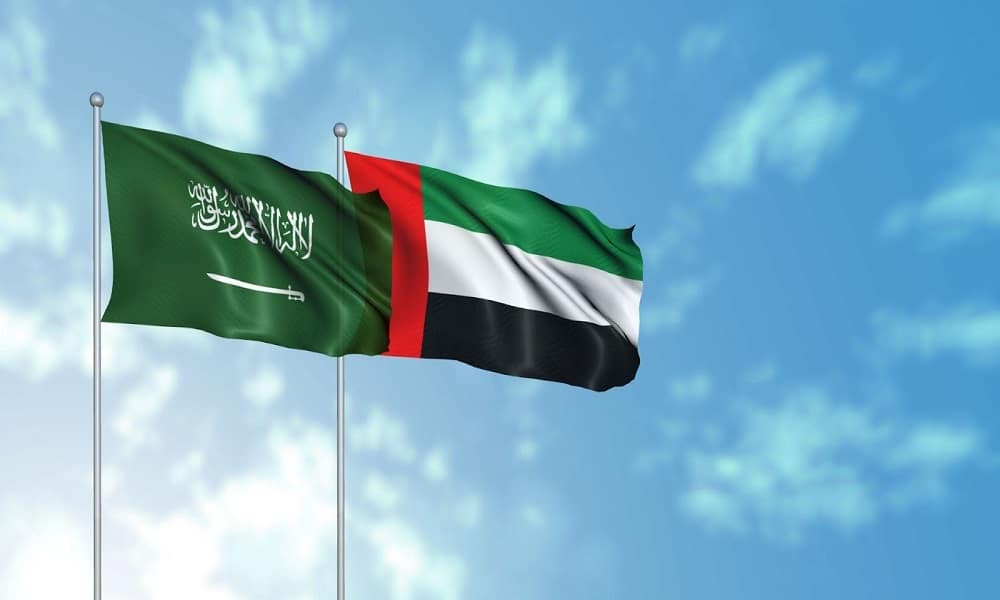UAE has consistently maintained its status as one of the prime destinations for global investments. In 2025, the country’s economic growth is projected to lead GCC (Gulf Cooperation Council) countries, primarily through FDI (Foreign Direct Investments), in promising sectors.
The economy is projected to grow from 4% in 2024 to 5.1% in 2025 and 2026, signaling a positive outlook. However, growth in the non-energy sector is expected to ease slightly, from 4.5% to 4.3%, due to capacity constraints in industries such as tourism, real estate, construction, transportation, and manufacturing.
The investments in digital and technological sectors, renewable energy, and green initiatives contribute to the economic growth forecast. They also play a pivotal role in shaping the UAE’s policies, which emphasize diversifying investment sources and promoting climate sustainability.
GCC Economies To Rebound With 4% Growth By 2025
The latest economic updates for the GCC say their economies are redefined for robust growth in 2025. This rebound is attributed to the stabilisation of oil production and the continued expansion of non-oil sectors.
The Saudi Arabian economy experienced a decline primarily due to the outcomes of OPEC+ production cuts since late 2022, with oil output averaging 9 million barrels daily. In 2025, the growth outlook for the country anticipates a healthy turnaround, which is said to be driven by an increase in oil production and a surge in the growing non-energy sector.
Towards the end of 2024, GCC faced significant market volatility triggered by rising geopolitical tensions and oil price projections. Even if the renewed U.S. trade policies will continue to reshape global markets, the direct impact of Trump’s policies on GCC growth is expected to be limited in the near term.
Amidst these uncertainties, the UAE is still projected to grow in 2025 and lead the GCC region, driven by its robust non-oil sectors, including finance and construction. The UAE also aims to leverage foreign investment and strategic partnerships to strengthen ancillary industries.
The region’s world-renowned energy sectors will boost growth up until 2026 as GCC countries prepare to increase production. This signals a strategic shift towards addressing rising global energy demands and aligning with ambitious production targets in years to come.
Overall, the fiscal predictions for the GCC economies remain optimistic, with expectations for countries like the UAE and Qatar to maintain budget surpluses.
Regarding inflation, the region is expected to see a significant rise, primarily driven by the surge in housing prices in Saudi Arabia, which is likely to push the cost of living higher across the GCC.
“With the cost of living on the rise, driven by surging housing prices in Riyadh, we’re seeing an increased demand for premium office spaces. As businesses look to accommodate their growing needs in a dynamic market, high-quality office solutions have become essential, further fueling upward pressure on real estate prices across the city.” Paul Salnikov, CEO of The Executive Centre, a pioneer workspace provider in the GCC.
These trends indicate a strategic alignment with global energy demands and highlight the impact of housing costs on inflation within the region.
Saudi Economic Growth Likely To Accelerate In 2025
Recent reports predict Saudi’s economic growth in 2025 will accelerate to 4.8%, from 1.2% in 2024 and -0.8% in 2023.
Saudi Arabia, one of the world’s largest crude oil exporters, has reportedly been preparing to abandon its unofficial target of reaching $100 per barrel. Currently, crude oil prices average at $74.80 per barrel and are expected to remain broadly weak at $76.75 for the rest of the year.
The effects of lower oil prices and higher production volumes will balance (offset) each other out. As economic growth focuses on produced volumes, real GDP growth is expected to benefit and pick up in 2025 compared to 2024.
The broader impact of this outcome will allow the Kingdom to reverse past production cuts and gain market share. This prediction, coupled with other non-oil revenue growth, will help the economy boost growth faster.
The projections for non-oil activities will be strongly supported by a growth-oriented fiscal policy backed by the Public Investment Fund (PIF), which will focus on increased investment spending and spur growth in the coming years.
Diversifying Economies in the GCC
Saudi Arabia’s Vision 2030 initiative aims to reduce the country’s reliance on oil revenues by fostering growth in other sectors. As the GCC collectively focuses on a newer vision, many economists predict the growth rate in non-oil GDP will be largely in line with oil GDP very soon, at least in the next five years.
The Kingdom is seen to be increasing its investments in industries like tourism, entertainment, technology, logistics, and manufacturing, and they are already showing positive results. Projects like NEOM and Red Sea Development are already creating new economic opportunities.
Besides Saudi Arabia, other prominent GCC countries, such as UAE and Qatar, have also been exploring ways to diversify their economy and lighten their reliance on oil as their primary revenue source.


